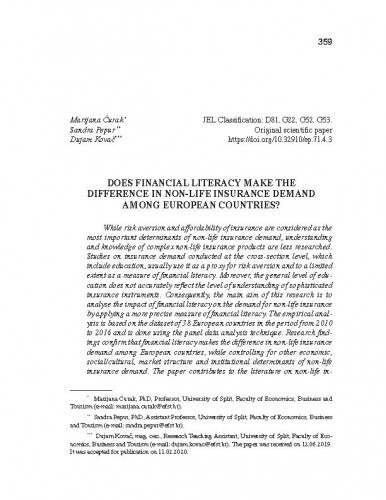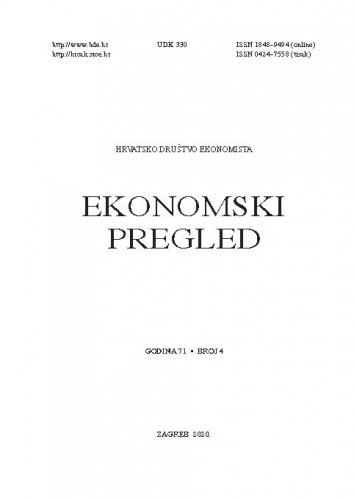While risk aversion and affordability of insurance are considered as the most important determinants of non-life insurance demand, understanding and knowledge of complex non-life insurance products are less researched. Studies on insurance demand conducted at the cross-section level, which include education, usually use it as a proxy for risk aversion and to a limited extent as a measure of financial literacy. Moreover, the general level of education does not accurately reflect the level of understanding of sophisticated insurance instruments. Consequently, the main aim of this research is to analyse the impact of financial literacy on the demand for non-life insurance by applying a more precise measure of financial literacy. The empirical analysis is based on the dataset of 38 European countries in the period from 2010 to 2016 and is done using the panel data analysis technique. Research findings confirm that financial literacy makes the difference in non-life insurance demand among European countries, while controlling for other economic, social/cultural, market structure and institutional determinants of non-life insurance demand. The paper contributes to the literature on non-life insurance demand, especially the one on the relationship between financial literacy and the demand for non-life insurance.; Dok su averzija prema riziku i dohodak uobičajeno razmatrane kao najvažnije odrednice potražnje za neživotnim osiguranjem, razumijevanje i znanje o složenim proizvodima neživotnog osiguranja manje su istraživani. Istraživanja o potražnji za osiguranjem na „cross-section“ razini, a koje obuhvaćaju obrazovanje, uobičajeno ga koriste za aproksimiranje averzije prema riziku i, samo u određenoj mjeri, za financijsku pismenost. Štoviše, opća razina obrazovanja nedovoljno odražava razumijevanje sofisticiranih instrumenata osiguranja. Stoga je glavni cilj ovoga istraživanja analizirati utjecaj financijske pismenosti na potražnju za neživotnim osiguranjem primjenjujući precizniju mjeru financijske pismenosti. Empirijska analiza je bazirana na podacima 38 europskih zemalja u razdoblju od 2010. do 2016. i tehnici panel analize. Rezultati istraživanja potvrđuju da financijska pismenost stvara razlike u potražnji za neživotnim osiguranjem među europskim zemljama, uz istodobno uvažavanje ostalih ekonomskih, socijalno/kulturoloških te institucionalnih čimbenika, kao i onih vezanih za strukturu tržišta. Rad doprinosi literaturi u području potražnje za neživotnim osiguranjem, posebno u dijelu koji se odnosi na vezu između financijske pismenosti i potražnje za neživotnim osiguranjem.
Sažetak

 Ekonomski pregled : mjesečnik Hrvatskog društva ekonomista : 71,4(2020) / glavni i odgovorni urednik Josip Tica.
Ekonomski pregled : mjesečnik Hrvatskog društva ekonomista : 71,4(2020) / glavni i odgovorni urednik Josip Tica.